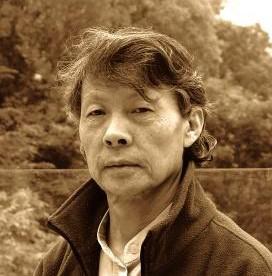Dichter
Ya Mo

Ya Mo
(China, 1942)
Biografie
Ya Mo (哑默), pen-name of Wu Lixian, is a pioneer underground poet of the 1960s and 70s in Guizhou province, southwest China. He was associated with Huang Xiang, and, together with other poets from Guizhou, they launched an underground journal, Enlightenment. In October 1978, the Guizhou poets traveled to Beijing to promote their journal; they met with Bei Dao, who then launched Today with Mang Ke in December of that year, inaugurating a brief period of time in which independent poetry flourished, before it was suppressed two years later. This is well-known history but what’s special about Ya Mo is that he is one of the very few poets that have remained independent and, as a result, extremely marginalized.Born into a “bourgeois” family of the Nationalist Party (which moved to Taiwan in 1949 during the change of power), Ya Mo had his own study and library in childhood but lost everything during the Cultural Revolution (1966-1976). He underwent hardships even before the Revolution and was not accepted by any college because he came from a politically incorrect family. He started to teach at the Wild Duck Pond Elementary School in the outskirts of the provincial city Guiyang in 1964. His home became a meeting place for aspiring poets, lending its name to the Wild Duck Pond Salon, which continued for over 10 years. Like the Pre-Misty and Misty poets in Beijing, Ya Mo was self-taught through extensive reading, but he was different from the Beijing poets, who were mostly from privileged families. They had access to the “Yellow Cover Books” and “Gray Cover Books” that circulated among high ranking officials in the 1970s as “negative examples” of Western literary and philosophical works, while Ya Mo was mostly nourished by literature published before 1949.
One critical view of Ya Mo is that his poetry is not as “avant garde” as that of the Misty poets such as Bei Dao and Duo Duo, who have been hugely influenced by Western poetry. Ya Mo seems to have followed the tradition of the earlier modernists in the 1930s in China. For instance, his poem THE IMAGE has a similar syntax as in Fei Ming (废名)’s poem “The Night of December 19”:
is a flower, is fish
is a dream in the air
…
is home
is sun
is moon
is light
is fire in the stove
—from “The Night of December 19” by Fei Ming, 1936
is a wave
is a fence
is a curved spectrum
is a bamboo screen…
—from “The Image” by Ya Mo, 1979
The 1930s were the first golden age of modernism in China, started by poets who returned from abroad. Zhao Luorui’s translation of T.S. Eliot’s “The Waste Land” was published in 1937, and we see an echo of the “waste land” in Ya Mo’s poem IMAGE but the local Chinese influence seems stronger. Fei Ming (1901-1967) mentioned above was known as a practitioner of Chinese New Poetry without Western influences and an acclaimed writer of Chinese Zen poetry. Ya Mo seems to belong to this tradition but there also seems to be Russian influence; for example, the seagull in Ya Mo’s poetry is a frequent image in Russian literature, which was translated into Chinese in the 1950s before Western literature rushed into China in the 1970s. Ya Mo is different from Fei Ming in that his poetry reflects more of his own time in a socialist country where “social classes” affect one’s opportunities for education and career, as seen in his poem HOMELAND where he plays with the pun of “class” (ji) and “pole” (ji) speaking about labor camps, famine and death in remote corners of the country like the cold North/South poles.
Home, you are divided into several poles or classes
the long silent snow-capped land, the permafrost zone
the desert that still has life
A hidden, recurrent theme is the separation of families in 1949. He constantly calls out to his “brothers” and former “neighbors” that are far away now (as in 'HOMELAND'), he calls out like the bird in his poem SEAGULL:
It faces the tides, calling out
to its silent companions.
Born in 1942, Ya Mo has lived long enough to witness the coming and going of various trends and styles among several generations of poets in China. Poetry of the 1930s was rediscovered in the 1990s and early 21st century, which placed Ya Mo in a very small group of poets in a direct line from the earlier modernism and, as well, in a pioneer position in terms of changes in aesthetics and the avant garde writings of his time.
Ya Mo literally means “dumb-silent” in Chinese. The poet is reclusive and engaging at the same time, a silent and sometimes not quite silent witness of the poetical and political changes in China over half a century. While Huang Xiang was jailed six times and eventually exiled to the US, Ya Mo has kept a low profile, quietly writing essays and diaries to document history. His poetic language is simple and elegant simultaneously. Although labeled as one of the early Misty poets, his style is idiosyncratic and his tone much quieter. He doesn’t sound as lofty, nor his poems as heavily loaded with Western imagery as the Misty poets. He is down to earth, engaged with social issues more directly but in a soft-spoken way, his political sharpness hides inside his mild temperament. Grossly underrated and completely blocked by the mainstream literary system and its favorites, Ya Mo has hardly ever been studied or translated. Yet his influence persists among the hard core of independent poets in contemporary China.
© Ming Di
Gedichten
Gedichten van Ya Mo
Sponsors
























